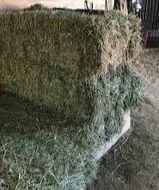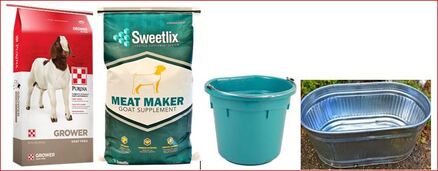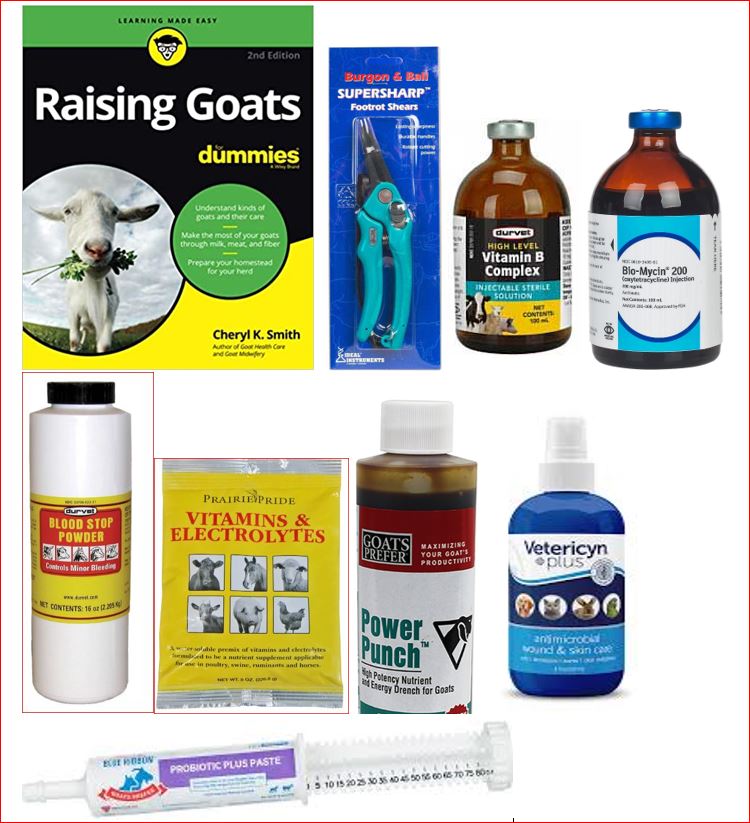|
Goat Health Basics

Our Feed Program
The Girls: During mid-late pregnancy through lactation the doe's get green leafy alfalfa/grass mix hay & a complete pellet goat feed with 18% protein mixed with Sunflower Seeds. They have free access to minerals & sea kelp meal at all times. When "dry" (not pregnant & not in milk) our doe's get good grass hay & a small amount of their grain ration, plus their minerals. Our Boys: Our bucks receive only good grass hay, (very little alfalfa/only as a treat - as we believe alfalfa increases urinary calculi in bucks/wethers - See more about Urinary Calculi under the vet care page). They have free access to minerals & sea kelp meal at all times. Our boys usually get a small handful of treats daily, such as raisins, sunflower seeds, dried leaves or branch trimmings. They especially LOVE animals crackers! *We also give our bucks/wethers Purina Goat Grower medicated feed throughout their lives, especially during the first year or life. Goat Grower is specially made with added Ammonium Chloride to prevent urinary calculi, urinary stones which can cause dangerous urinary blockage in males. All animals get fresh clean water in clean buckets. It is very important, ESPECIALLY FOR BUCKS, to have clean water buckets with fresh water! Goats will drink considerably more if they have clean fresh water - which is a MUST to keep the animals urinary tract in good working order. We have found our goats do well on Sweetlix Meat Maker loose goat minerals. This is a loose mineral left out 24/7 so they can enjoy this mineral whenever they need it. We keep it fresh by adding ac up or so every few days & keep in inside the stall where it can stay dry & fresh. Baby Bottle Feeding
I believe whole-heartedly that a baby is best left with it's momma in those first few early days. We want our babies to get that wonderful colostrum in the first few days and to build that beautiful mother/kid bond. We spend time with the kids every day socializing them to people. About 4-5 days old we will start teaching the kids to take a bottle so that we can begin separating them from mom at night & during shows or while moms are on milk testing. It also helps to make them friendly. A basic rule of thumb for bottle feeding goats is to feed 10% to 15% of the kids current body weight per day but they typically eat more than that. WE DONT USE OR RECOMMEND MILK REPLACERS! We are fortunate to have goats milk onhand and we mix it 50/50 with Whole Cow milk from the local grocery store. If you don't have clean fresh goats milk, then we recommend whole cow milk from the grocery store. This is a basic bottle feeding schedule for Nigerian Dwarf goats. We monitor closely and we feed all kids over 3-4 weeks twice a day with them eating nearly full 12-16oz bottles AM & PM. If a kid is smaller/weaker/falling behind then we add in feedings as needed. Feeding smaller amounts, more often can help to avoid issues for those kids not wanting a full bottle. ALSO ITS VERY IMPORTANT THAT THEY RECEIVE SELENIUM/VIT E! Preferably the mom received a standard 2cc BoSe shot before she kidded. We dose the mom's and we give a tiny bit of Colostrum Gel & Selenium/Vitamin E Gel at birth to all babies. Our area (& most of the US) is very Selenium deficient.
|
Our Deworming & Preventative Parasite Program
Babies are dewormed with Valbezan dewormer @ 3 weeks, 6 weeks, & 9 weeks. After weaning, babies are wormed the same as the adults. Our babies also get a dose of Coccidia preventative at 3 weeks, 6 weeks, 9 weeks. We currently use Baycox liquid. Adults are dewormed with Valbazen dewormer a few days after kidding, and Ivomec dewormer before breeding in the fall & seasonally as needed. We try to use dewormers that treat external parasites like lice & mites too...that way we take care of 2 things at once. We also use injectable Ivomec 1% cattle dewormer at 1cc per 25lbs body weight, injected sub-Q, and repeated in 2 weeks. We only inject this dewormer when we feel there might be a lice/mite issue. Otherwise we use Ivomec 1% at the same dosage (or we use Moxidectin) given orally. DO NOT use Ivomec Plus or Valbazen on pregnant does as it can cause abortion in pregnant does! For lice/mites, which we have rarely had any issues with at all, we use Equisect horse flyspray as a preventative measure as a body spray for the goats and as a premise spray in the stalls. When necessary (usually in spring,fall,winter) we will treat the goats topically with Eprinex or diluted UltraBoss or Cylence. All goats are shaved down in the summer before show season & Linear Appraisal so that we can check for any skin conditions, health issues, and to get updated pictures & check the overall confirmation of the animal. Our Vaccinations & Supplements Program For our dairy goats, we have found a 3/4inch, 20 gauge needle to be the BEST all around needle to use. And 99% of our medications that require injecting are done subcutaneously and this needle size works GREAT! We vaccinate annually for: CD/T - (Tetanus) The bucks get an annual CD/T booster in late summer and the pregnant doe's get a CD/T booster 4 weeks BEFORE kidding so that it transfers to the babies before they're born. In recent years we have had reaction issues with CDT vaccines in our young babies, therefore we now wait until they are 8-10 weeks and give their 1st dose at that time. Their mom's are also dosed before the babies are born. We give Selenium & Vitamin E Gel or injectable BoSe 1 month before breeding season and for the pregnant doe's they get it again about 3-4 weeks before kidding. We give copper bolus supplement sparingly if it's needed during the year. We have determined that maintaining proper Selenium/Vit E levels & copper levels in our herd has helped with breedings, coat & hoof condition, overall confirmation, improvements in ease of kidding & stronger healthier kids too. How to Video's on "How to Give Injections" This one is using a sheep but is my favorite video showing the PROPER way to give medications. I found there are many out there that do not show the proper method in giving injections. Click here for "RSG Subcutaneous & Intramuscular Injections" Second option showing how to give subcutaneous injections behind the armpit/elbow area. "Subcutaneous Injections Goat Husbandry Series" 
Hoof trimming
HOOF TRIMMING IS IMPORTANT!! Hooves are trimmed about every 6 weeks depending on the needs of the animals. HOOF TRIMMING VIDEO: This is a great lil' video about trimming your goats feet. We trim very similar to this, only we trim a little deeper & yes, we usually run into a touch of blood, very normal. http://www.youtube.com/watch?v=k-vnw0uIRzo&feature=related Basic Hoof Trimmers can be found at local feed stores and farm supply stores or Amazon or online at Valley Vet or Jeffers like these: Valley Vet trimmers, Amazon Trimmers, or Jeffers Trimmers. Must Have Items To Have On Hand:
|


